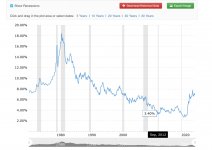Yeah, my parents. Traded up in 2006, more so than was advisable for their worth, forced to sell in 2020 due to illness. Sold it for what they bought it for, so out a ton on interest. Looked the property up today, it's up 35%.
That does truly suck for your parents. But I am happy for them and you that they still got to keep their equity (and their dignity) and didn’t have to foreclose.
The example I was referring to was more along the lines of young 2006 buyers who stretched themselves, and found themselves on the difficult end of the decision to either short sell or foreclose in 2009-2010….because they were underwater. They obviously had some personable accountability there, but no one could have really seen that coming in those 2006-2008 years.
I don't think this applies to people with little equity. Trading in a $400k mortgage at 3% for a $600k one at 7% causes yearly interest to go from $12k to $42k. When the rate goes down to 3.5 that comes down to only $24k. A difference of $2k per month. The change in home price mostly evens out, as they are selling one property and buying another.
I think it applies universally to a certain extent. I also don’t think we’re gonna see 3.5% on a 30-year mortgage ever again, so that’s not really in my purview as a possibility.
Say I’m a young renter, but I have a good job and $30,000 saved for a down payment. I want a $300k house (pretty much the bare minimum these days), but it’s a stretch for the monthly payment. I’m quoted a 7% rate. PMI let’s say is $150.
My monthly payment is $2,210.
Or, I decide to wait until rates improve. Election comes and goes, inflation keeps going down, whatever….Fed finally drops rates. So, a year from now I get a 5.5% quote. Cool! At that rate….with the same $300,000 house, my payment drops to $1947.
…..except it’s not the same $300,000 house. The rate drop boosts the pent up demand, pushing prices up again, and that same house (or an equivalent) is now listed at $350,000.
So then the monthly payment is right back at $2,157, just $53 cheaper per month than the $2,210 above. And, I’ve flushed another $15,000-$18,000 in rent down the toilet over that year I was waiting.
So like I said, zero sum game. You have to be unbelievably lucky and more or less predict a 0.5-1 basis point drop, get under contract, then not sign the paperwork until after it happens in order to not be affected by the yo-yo of interest rates vs. list prices. Doesn’t matter if you have equity or not, it’s the same principle.
That's the conventional wisdom....but it keeps not happening. I think its because Boomers may be finding themselves with more house than they need....but they are sitting on million dollar 401ks and aren't quitting their jobs....so why trade down?
The main reason to trade down at that age is reduced maintenance, upkeep, and property taxes. It keeps “not happening” right now because rates are still sky high….and even by trading down in terms of size but getting newer / nicer finishes and appliances….they would end up with the same payment or maybe even a higher payment. That won’t be the case when rates drop. They’ll have higher demand for their existing home where they have significant equity, and that will drive the price up. Whatever price increase they get is straight money in their pocket, and might be the difference between a small mortgage on their new property vs. being able to go straight cash. If they are true empty nesters, they will generally all want to downsize at some point. Only question is when.
I also don't expect younger homeowners to do the smart thing. In my experience 90% of Americans will buy as much as they can afford...or more.
I’m considering younger homeowners to be in that 35-45 demographic. Considering that most folks starting out in the world and starting to think about that first home purchase were in their mid-20’s around 2008, I think that’s the age group that was most profoundly affected by the fallout in a cautionary sense.
I’m in that particular age group myself. And I know in my particular neighborhood (which is fairly uniform in terms of home size and amenities), everyone around my age that is a homeowner is generally in a 2-income household. Ours is just primarily a one income household (mine). I do OK, but in no way do I kill it in terms of income compared to my area. But I’m still well under 20% as far as my mortgage payment vs. my monthly take home pay, whereas the recommended max % I think is considered to be 25% of your gross income (not take home). I think if we are able to manage that threshold in a single income household…..all my 2-income household neighbors should easily be doing the same.
So at least in my locality, that 90% estimate is a tad high. Of course your mileage may vary. I do think 2008 changed a lot of people’s perspectives.
